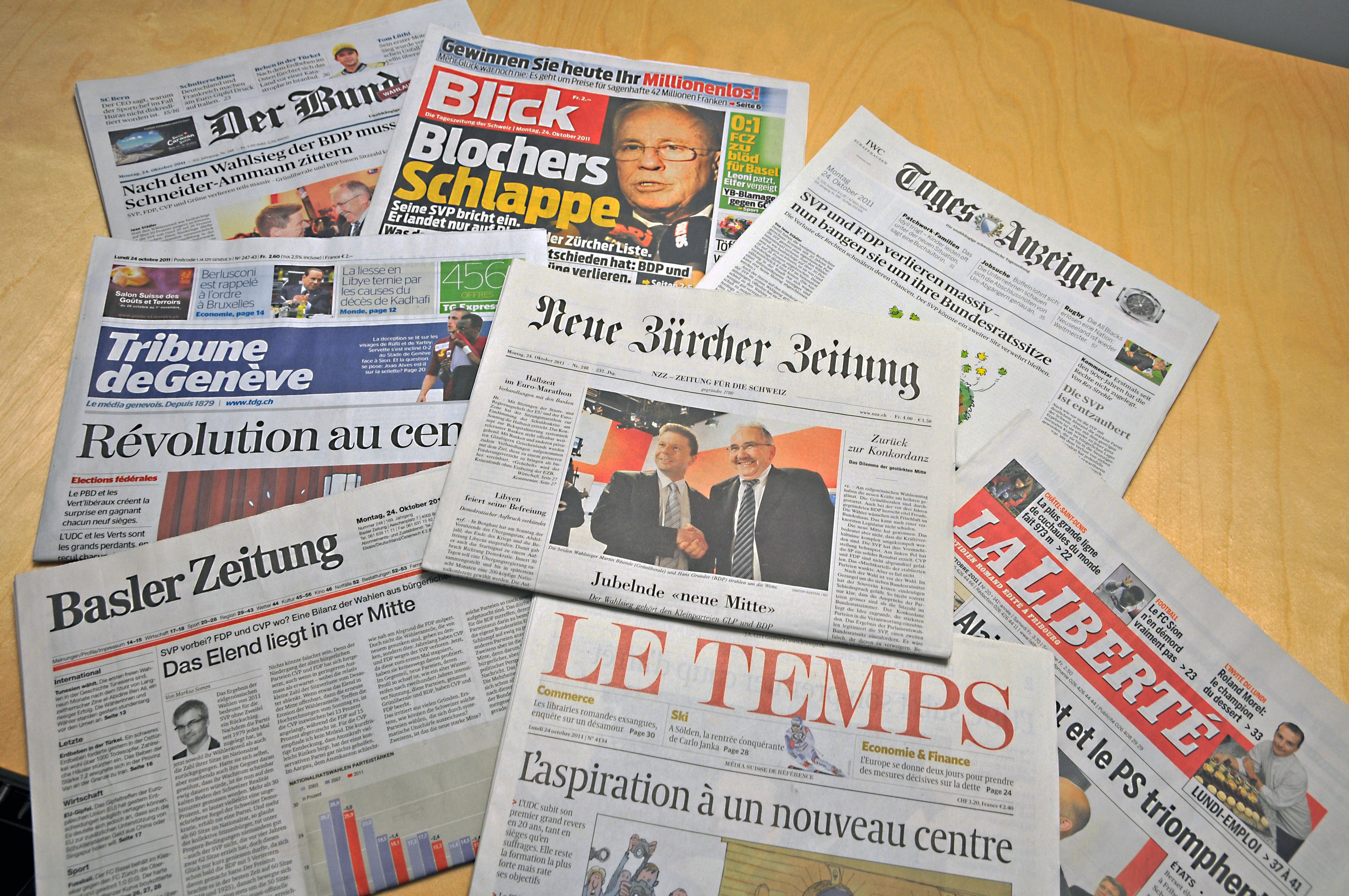Media ponders election fallout for cabinet

Swiss newspapers have been mulling the consequences of Sunday’s parliamentary polls for the cabinet election in December – and have not made up their minds.
A less powerful rightwing Swiss People’s Party – which suffered a big loss – might actually make it more eligible for a second seat in government, some commentators argue. Meanwhile, the success of the new parties has strengthened the centre.
The People’s Party and the centre-left Greens suffered the biggest losses in the House of Representatives. The three other main parties also saw their support drop.
But the Liberal Greens, a Green Party splinter, gained at least nine seats and the Conservative Democrats, formed by moderate members of the People’s Party in 2008, gained an extra four mandates in the House of Representatives.
“The magic ends for the People’s Party,” was the Zurich-based Tages-Anzeiger’s verdict, while Geneva’s Le Temps saw “a strong knockback” for the party.
The papers made much of the fact that no one had predicted this outcome, not least the party itself which had thought it would gain 30 per cent of the electorate – it actually dropped 3.6 percentage points to 25.3 per cent – and make bigger inroads into the Senate that it actually did.
Image problem
“The party maintains a rightwing image at a time when the country thinks that we should be finding solutions in the centre to deal with an economic situation which is becoming ever more difficult and uncertain,” Le Temps said. For the 24 Heures newspaper, the result came from the party’s “lack of viability in decision-making bodies and its permanent opposition role”.
However, many German-speaking commentators saw the defanging of the People’s Party as chance. Most had no objection to the People’s Party gaining a second seat in cabinet during the elections of December 14 – after all it was the strongest party in the elections.
Under an informal rule, the major Swiss parties share out their seats in cabinet according to their political strength in parliament. But currently the People’s Party only has one.
Perhaps the party would field more team-spirited candidates for the cabinet elections and decide to be less aggressive towards the other parties after this setback, commented Bern’s Bund.
No “Fukushima effect”
The media also expressed surprise at the lack of success for the Green Party, which, as 24 Heures and Le Temps noted, could not benefit from the “Fukushima effect” – an expected upswing after the Japanese nuclear accident earlier this year.
The Liberal Greens therefore took up the slack, they said.
The success of the new centre parties was also feted. “Jubilant ‘new centre’” was the title of the Neue Zürcher Zeitung, along with a picture of the beaming leaders of the Liberal Greens and the Conservative Democrats.
In its editorial, the paper said the result was a desire by the electorate for “fresh air in parliament”, while Lausanne’s Le Matin saw it as an “electric shock” for the parties in government, who when they found out the result looked “a bit fed up and like bad losers”, blaming it on “a trend”.
The centre’s dilemma
The NZZ nevertheless saw a dilemma for the strengthened centre. It has calculated that between the poles of the People’s Party and the centre-left Social Democrats, the second strongest party, there should be three seats for the centre-right, including the traditional government parties the Radicals and Christian Democrats.
The success of the Conservative Democrats, which has one cabinet member, Eveline Widmer-Schlumpf, was not necessarily strong enough to warrant its own seat, it argued.
For its part, Basler Zeitung saw the centre’s success as causing instability to the system because majorities would become less clear.
A view shared by the Italian-speaking Corriere del Ticino’s editorial, which pointed to a “less polarised but more fragmented parliament” and a “centre divided into four”.
The tabloid Blick, however, thought that Widmer-Schlumpf could be in with a better chance of re-election, as her opponents – the People’s Party in particular – had been weakened.
Several papers thought that it was now impossible to predict an outcome for December 14. And although there were many questions to be answered, one thing was certain, Blick added: “exciting times are ahead”.
People’s Party: 54 seats (-8)
Social Democrats: 46 (+3)Radical Party: 30 (-5)
Christian Democrats: 28 (-3)
Green Party: 15 (-5)
Liberal Greens: 12 (+9)
Conservative Democrats: 9 (+9)
A record 3,458 candidates competed for the 200 seats in the House of Representatives and 44 of 46 Senate seats.
About 5.1 million citizens, including more than 700,000 Swiss expatriates, were eligible to vote.
About 21,000 registered Swiss expatriates could cast their ballot online in ongoing trials with e-voting.
Turnout was expected to be around 49%. Most votes are cast by post.
Elections take place every four years in the second half of October.
The new parliament will choose the seven-member cabinet on December 14.

In compliance with the JTI standards
More: SWI swissinfo.ch certified by the Journalism Trust Initiative














You can find an overview of ongoing debates with our journalists here . Please join us!
If you want to start a conversation about a topic raised in this article or want to report factual errors, email us at english@swissinfo.ch.